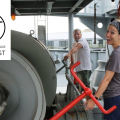Office Space I don’t like my job and I don’t think I’m gonna go anymore.mov
Peter decides he’s not going to go to his job anymore.
That look of bewilderment on Jennifer Aniston’s face is one I sometimes have on the other end of the phone when a candidate presents unfounded reasons over and over as to why they left their previous job(s). While this may be one of the funniest scenes in the movie Office Space, in real life, being Peter is not so funny.
Ultimately, Peter’s reasons are justifiable and the perfect ingredients for the Molotov cocktail of emotions that boil over during this conversation. His work is unfulfilling, he dislikes his boss, the majority of employees are also miserable and on top of all that, the company recently hired outside consultants to determine whose expendable. Sounds like the perfect excuse as to why one should start searching for a new job.
However, if this were an interview, Peter would have failed miserably. Take note in this scene that Peter (played by Ron Livingston), cannot explain what he nor the company does, why he’s suddenly deciding to quit or what he wants to do afterwards. Additionally, take note of his poor body language, sarcastic tone and lack of energy. To put it simply, Peter comes across as unstable. Sadly, this is often how some candidates present themselves both on their resume and during an interview.
Written by Grant Cardone, “Be Obsessed Or Be Average” is considered one of the best motivational books of 2016. One earth shattering quote that echoes the feelings of many in the workforce, “When I didn’t know why I was getting up and doing what I was doing, I felt like I was dying inside.” Like Peter, most employees work is unfulfilling, the culture is not one that values its people, restructuring and layoffs are a norm and leadership is poor. They eventually find themselves going from one hamster wheel to the next and before you know it, they’ve worked seven jobs in 10 years.
So why is this not attractive to hiring managers?
Candidates are often bewildered as to why hiring managers are quick to dismiss a so-called job-hopper. It’s rather simple. MONEY! According to a 2012 study from The Center of American Progress entitled There are Significant Business Cost to Replace Employees, businesses spend about 1/5 of an employees salary to replace that worker. So let’s put that into context. A HR Manager making $125K quits. The company has to find a replacement and fast. It cost approximately $25K to onboard the new HR Manager. If the company sought the need of an executive search firm, an additional $25-31K is due for their services upon hire. Lastly, say relocation assistance and a sign on bonus equates $15-20K and the whopping total for a replacement candidate is anywhere from $50-70K. Thus, if the cost to hire the next candidate extracted $50-70K from your budget, would you prefer to hire a passive candidate with a stable and progressive background or someone with seven jobs in 10 years?
This is the dilemma that so-called job-hoppers inadvertently place themselves in. In essence, it really has nothing to do with whether the person is over or under qualified. The hiring manager is forced to make a determination as to which candidate will give them the best bang for the buck. Do you hire the person who has shown stability or instability? Or to put it more simply, is this hire worth $50-70K before paying them a dime in salary?
Now that the true cat is out the bag and you understand why job-hopping is looked down upon. Here are my Top-10 Reasons of how to avoid the game of career hopscotch.
#1 WithHOLD Irrational Thinking Before Making a Move
Resume Advice: “It’s nonsensical that people voluntarily quit their job before landing the next one. Now of course there are exceptions to the rule in every circumstance, but technically it should never get to the point of no return, because there likely was enough forewarning to look for a new job months in advance. Clients that partner with search firms desire passively employed candidates more so than voluntarily active unemployed applicants. Now don’t get it twisted, whether passive or active, “employed” is the key word. Don’t lose leverage to negotiate. Employed candidates are more attractive to employers. Remember that the next time you think about quitting before having a bird in hand.”
That piece of Resume Advice led to a firestorm of feedback and I’m not the first to ignite the notion that one should have a job before in hand before leaving another. Whether you want to believe it or not (in some, not all instances), employers who elect to pay a recruitment agency for identification and placement of top prospects to their vacancy, have a tendency to favor passive or recently transitioned candidates over those who have been idle for a considerable amount of time. Therefore, it may be wise for candidates to HOLD. Don’t allow emotion to lead the charge of your decision. First assess the situation and circumstances in its entirety. Consider all variables and probable outcomes before taking the proverbial a leap of faith.
No visual is more profound than the epic scene from the movie Braveheart. Take a listen to advice from Dr. Eric Thomas (@Ericthomasbtc) before watching the scene below. It may help you hit the pause button before clipping the umbilical cord and develop an effective plan of action for successful transition.
13 Braveheart mp3
To order your official ETA apparel shirt, click here http://shop.etinspires.com/ If you are ordering from Europe, please use this link! http://www.incipioacademy.com/shop/en/ Click here to follow ET on Twitter! https://twitter.com/Ericthomasbtc To order your copy of ET’s Debut Autobiography click here: http://shop.etinspires.com/collections/all/products/the-secret-to-success Wake Up Alarm Tones: http://www.cdbaby.com/cd/etthehiphoppreacher17 General Info: [email protected] Breathe University Enrollment Open ENROLL NOW: http://www.etinspires.com/breathe Get your Copy of Eric’s Audiobook by following the links below…
If Dr. Thomas’ summation didn’t inspire you, maybe the actual movie clip will. Note, he nor the clip shows what happens in the scene prior. As the Scots goad the British to attack, several of their comrades run off on their horses giving the appearance of retreat. Well, in actuality, once the plan comes to full fruition and the scene extends, those same warriors flank the British from the rear completely overwhelming the enemy. The precise execution of this plan led to an improbable victory by the Scots in the Battle of Stirling, for which Sir William Wallace became legend.
Braveheart (4/9) Movie CLIP – Withstanding the Charge (1995) HD
Braveheart movie clips: http://j.mp/1J9Efn1 BUY THE MOVIE: http://amzn.to/syjqRi Don’t miss the HOTTEST NEW TRAILERS: http://bit.ly/1u2y6pr CLIP DESCRIPTION: William (Mel Gibson) leads his men in battle with a cunning move that withstands the charging horsemen.
Hopefully, you didn’t miss the message. The Scots had a plan. Sadly, many employees do not when deciding to leave a job. They become overwhelmed with emotion, which leads to irrational thinking and a sometimes foolhardy decision. It’s a formula that dooms many toward a downward spiral of future poor career judgements. Before a candidate realizes it, they have made several moves in a short period of time leading a hiring manager to assume this person, while impressive and fully capable, is not someone they wish to add to their team. Understand, hiring managers do not pay search agencies to identify job hoppers. Those candidates are already applying online for free.
#2 Identify an Industry Specific Recruiter
Resume Advice: HR Leaders, conventional wisdom suggest never making an emotional decision without taking into account rationale. Therefore, no one should EVER consider quitting a job without first having a new one (unless the circumstances are so dire that it is affecting your physical health). With a firm understanding that hiring managers prefer to hire passive candidates, it MAY be detrimental to your career well-being if you quit without first securing a new role. If things are uncomfortable, don’t quit, “Call Tyrone!” We may have the perfect role waiting in the wings for you.
One mistake candidates make is not connecting or establishing relationships with the right search practice. For example, a lawyer seeking a full-time job, has no business communicating with a staffing firm that places nurses. Before wasting time in speaking with the wrong recruiter, research the organization to ensure it specializes in your space. Thereafter, connect with recruiters who have expertise and a successful track record in hiring professionals in your field. Understand recruiters are not contractually obligated to get you a job. While they certainly have your best interest in mind, identifying the ideal match may take time. So its important to have an open dialogue and occassionally check in to see if there are any vacancies that make sense for you to be considered for. But remain vigilant. Don’t put the hopes of your future solely in the hands of an executive recruiter; rather, continue to network and apply for jobs that logically make sense for career well-being and advancement.
#3 Know What You Want
Career Pivot: Know What You Want and Ask for It
In this segment about how to successfully navigate career transitions, Founder and CEO of the Business Talent Group Jody Greenstone Miller discusses the foundation of any career pivot – matching your career objectives with your life cycle, which today’s employment environment allows you to do like never before.
Jody Greenstone Miller’s interview offers some great advice on the Top 5 Strategies for Surviving a Career Pivot. In order to effectively manage a career change, the first item on the docket of a candidate’s list is to “Know What You Want.” Often, I speak to candidates who have no clue what they want. Here are some things to consider before speaking to a recruiter or applying to a job:
A) Time: Know how much time you’re willing to commute, working hours
B) Relocation: Specifically know locations of interest and if self-relocation is an option
C) Travel: Know the percentage you wish to spend on the road
D) Salary Range, Job Title, Scope of the Role, Size of the Company, Career-Advancement opportunities, Industry, Ideal Culture, etc.
Before speaking with a recruiter or applying for jobs, it’s essential to know what you want; otherwise, you may end up in a new environment facing the same set of unfortunate circumstances that led you to leave the prior employer.
#4 Prepare For Rain
Resume Advice: One thing I notice about “some” candidates is they wait too long to jump off the springboard. When the 1st round of murmurs start churning at the water cooler that changes are immanent, I’d recommend taking a trip to the beach and revamping your resume. When the 2nd round of murmurs start, it’s time to dip your toe in the water and start applying to openings. When the 3rd round of murmurs start, you best to be interviewing! Because by the 4th round, you may be asked without warning to pack your belongs and return your key card, you’ve been laid off…
Facing The Giants Prepare Your Fields
Prepare For Rain If you’ve seen the movie “Facing the Giants” you may remember the scene where the Coach is speaking to the older man Mr. Bridges that prays over the kid’s lockers every day.
There are many instances in the Bible and other books of faith where a lack of preparedness led to the demise of a people. Regardless of your personal belief, being unprepared could lead to a failed interview, poor on the job performance, or failure to recognize layoffs on the horizon. In order to be successful in life, let alone one’s career, being prepared in a necessary evil. Now ask yourself this. If something were to happen to your boss, are you prepared to assume his or her duties? If you were laid off unexpectedly, do you have money saved to pay off living expenses during the drought of unemployment? If you desire a new opportunity, is your resume up-to-date and laden with strong quantifiable accomplishments? And have you engaged with a recruiter who specializes in your field to watch out for you as you remain gainfully employed? All these questions and more must be answered with a yes; otherwise, you may be doomed to fail.
#5 Know When To Walk Away
Resume Advice: Upon initial review of a C/V, hiring managers scrutinize two things: The number of companies worked for over a certain period of time and the length of tenure without progression. Candidates must be cognizant that both can be advantageous to career advancement. In actuality, candidates are darned if they do, darned if they don’t. Playing career hopscotch without growth suggest instability and most companies and recruiters alike are leery of investing in the so-called “job-hopper.” Meanwhile, staying in one place too long without progression could unfairly suggest a lack of ambition. So have a shot clock in your head and smartly recognize when its time to shoot the ball.
The Devil Wears Prada final scene
Uploaded by LadoIordanidze on 2015-11-26.
Going back to the previous four points reasons, take note of how Andy (Anne Hathaway’s character) evolves in the movie Devils Wears Prada. Despite not being hired as a journalist, she withheld the initial knee-jerk reaction of quitting. She worked hard to gain respect, networked along the way, and ultimately landed a role as a reporter, upon realization that this journey reached its end point.
#6 Leave Only If You Can “Afford” To Quit
Career Tip: By happenstance, this week’s theme was centered around being wise in career movement. Whether fair or not, one caution flag is all it takes during an interview or upon review of a resume to dismiss an applicant. As a proponent of Dave Ramsey’s Baby Steps, if things are so dire that one must quit, I encourage those to possess 6 months of savings as a rainy day fund. This should sustain one for the average length of time it takes to land the “right job.” One can get so filled with emotion that they often quit with no pot and as a result are forced to take any old job to make rent; only to be miserable 3 months later due to a pay cut or the job/title/company not being a fit.
Husband Wants To Quit His Job
Learn to budget, beat debt, & build a legacy. Visit the online store today: https://goo.gl/GjPwhe Subscribe to stay up to date with the latest videos: http://www.youtube.com/user/DaveRamseyShow?sub_confirmation=1 Welcome to The Dave Ramsey Show like you’ve never seen it before. The show live streams on YouTube M-F 2-5pm ET!
The reason why I’m so resolute about not ditching a job before having one lined up goes back to the same reason why hiring managers are so particular when it comes to candidate selection – MONEY and BUDGET! The one question a person thinking transition must honestly ask before pulling the plug is, “Can I emotionally and financially afford to quit?” If the answer is no, that’s not a bad thing. In taking a hard look at the entire situation and circumstances beyond the decision, one likely comes to the conculsion they can temporarily bear the pain, while taking the proper steps towards finding a new job. Why is this so important you ask? Again, it goes back to the way hiring managers think. Some believe it’s safer or more preferable to hire an employed/passive candidate as opposed to an unemployed/active job-hopper.
Understanding it takes anywhere from 3-8 months on average to identify a job that may fulfill you, it’s wise to learn and practice Dave’s Ramsey’s Baby Steps so money does not become a factor in your decision making. Think about it, it you have no debt and an emergency fund of 6+ months, it’s a lot easier to walk away from an unethical company or an unsavory boss.
#7 Find The Right Fit, Not The Right Job
Tip: “Protect the Shield” is to the NFL as “We Must Protect This House” to Under Armour. The common denominator in both those famous phrases is “Protect.” Today, both employers and candidates alike fail to protect their respective brands. Companies poorly showcase their image with archaic ATS, slower than molasses processes and little feedback to those who apply or interview; meanwhile, candidates are at fault for neglecting to do their due diligence on the aforementioned, which have a track record for eliminating positions at the blowing of a new wind. Protect your brand! Candidates, don’t just accept any old job and companies treat those who want to work for you with respect.
TEDxMileHigh – Natalie Baumgartner – Fit
How well do you “fit” your career and workplace? In this compelling and researched talk, Natalie Baumgartner dives into this question and explains the psychology of finding something more in a career. As the co-founder of Round Pegg, Dr. Baumgartner uses her background in clinical psychology to quantify organizational culture and match potential candidates, revolutionizing the working lives of people searching for “fit.”
In all of my communications with candidates, I never hear anyone say, “I’m looking for the right fit; rather, it’s always, “I’d consider making a move for the right job.” I ask the same questions of every candidate I speak to. Many of those questions are along the lines of what they want, what doesn’t make sense, and what would be the ideal fit. Hiring managers fail because they often want to find a round peg for a square hole and candidates blindly just hope to be that round peg. In some cases, their prayers are answered and they’re a perfect match. But in many instances, the dream becomes a nightmare for both because the candidate neglected to properly investigate the company or interview the interviewers; meanwhile, the hiring manager blatantly disregarded or overlooked the warning signs.
In order not to fall into the trap of career hopscotch, it is essential to protect your brand. If you follow the previous seven steps, especially step #6, you’ll find yourself in a more suitable position to be selective for the company and job that’s your “right fit.”
#8 Don’t Be Afraid To Say “I’ll Pass”
TGIM SEASON 4 – I’ll PASS
Do you grab at every opportunity that comes your way? In this episode of TGIM, learn how to chose the opportunities that result in your ultimate success… General Info: [email protected] Breathe University Enrollment Open ENROLL NOW: http://www.etinspires.com/breathe Get your Copy of Eric’s Audiobook by following the links below…
Too many candidates find themselves in the proverbial trap of accepting just any job. They neglect to practice the aforementioned steps and end up in the same situation several months later. If you prefer turkey over ham, wait for turkey. Don’t take a job knowing the company is about to sell, business is failing, its a three hour round-trip commute and you’re asked to take a 30% pay cut. If your intuition says this isn’t in my best interest, its not! There is nothing dishonorable about removing oneself from consideration. Don’t settle now because you’ll pay for it later.
#9 Remain Patient & Persistent
Les Brown – The Chinese Bamboo Tree (Lesson on Patience)
One of the best short lessons from motivational speaker Les Brown. (All Copyright belongs to Les Brown LLC) This video is not infringing in any way and it only being used for educational purposes.
Step #8 and Step #9 are near equals. It takes patience and discipline in knowing what one wants so clearly to have the courage to say, “I’ll pass.” Fertilize and water your aspirations daily. Know that while the job you’re in today is not where you want to be tomorrow, the process of the wait is necessary to prepare you for your destiny. During the wait, persistence is key. Take the initiative to take on new projects or volunteer when no one else will, consult on the side, inform your connections of your career aspirations and attend networking events. Continue to grind, refine and polish your individual brand. And one day, courtesy patience and persistence, someone will knock at the door you didn’t know existed or someone will open the door you did.
#10 If All Else Fails…BAIL (smartly)!
If your health is compromised to the point of resign or be admitted to the hospital – LEAVE. If you’re so unhappy that the misery experienced at work is negatively affecting relationships at home – LEAVE. If your gut twist ad nauseam upon entrance of the building, make like the Poltergeist and “GET OUT!” However, if you toss and turn at night out of fright of returning to a place where blooming to your full potential is evidently impossible, consider the resume advice below and the nine aforementioned reasons Why Career Hopscotch is Hazardous to your Professional Well-Being. Doing so may help you from getting so overwhelmed with emotion that you make an irrational decision that only scratches the itch, but doesn’t alleviate the rash.
Contrary to what should be an invigorating experience, applying for new work can be an extraordinarily stressful procedure. While the health of one’s C/V must be in optimal condition to compete among elite contenders, it is also paramount for candidates to take care of their mental, spiritual and physical well being during what my be a painstakingly lengthy process. The inability to handle stress while interviewing is often cause for the lead horse to lose in a photo finish; especially in instances where searching for a new job is the full-time job. So read, meditate, pray, exercise, volunteer, be social. Don’t be afraid to step away and take a break. When candidates lack balance and focus solely on obtaining work, they tend to fumble before reaching to goal line of what was deemed to be a perfect fit.
Thus, for those at the precipice of making a career move, first consult with close advisors or mentors who have no true stake in the outcome of your decision. Should prayer and meditation be methods utilized to provide clarity or confirmation, by all means do it. Lastly, before announcing your final answer, consider the insight of those who approached “The Road Not Taken” before you. Maybe Tess Vineland’s book could do the trick, Leap: Leaving a Job with No Plan B to Find the Career and Life You Really Wants.
Why You Should Quit Your Job Without A Plan B | Money | TIME
Sometimes you have to take a scary leap in order to fly. Tess Vigeland, who wrote Leap: Leaving a Job with No Plan B to Find the Career and Life You Really Want, explains when it makes sense to quit your job without a Plan B: https://time.
In summation, my hope is that when the time does come to step away from your current employer, craft or career, one of two things happen: Submission of resignation follows a new job acceptance or you’re on the verge of an exciting and fulfilling business venture. Whatever it is that you decide to do, take your time, properly assess the situation and circumstances of your decision and please move smartly and without regrets.
#MyCupofTea | #KeepKnockin | Twitter | Facebook | Instagram | Resumes







Recent Comments